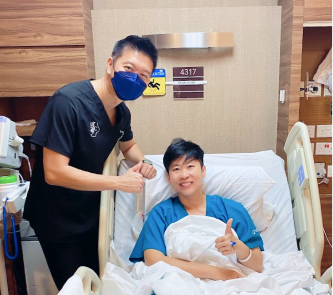Total Hip Replacement
The hip is a ball-and-socket joint that connects the femur (thighbone) to the pelvis. It is one of the largest and strongest joints in the body, and is responsible for both mobility and stability. The hip also plays a crucial role in bearing the weight of the body, allowing an individual to stand, walk, run and perform other daily activities.
The hip joint consists of muscles, tendons and ligaments, all of which work together to stabilise the joint. Any injury or disease affecting these tissues can result in pain and instability of the hip. Hip pain usually results from injury, overuse, repetitive stress, degenerative changes and medical conditions such as osteoarthritis.
Depending on the severity of the hip pain, treatment varies from non-surgical options like physiotherapy and joint injections, to surgical options like a hip replacement surgery in Singapore.
If you’re experiencing hip pain and limited mobility, you should first consult with an orthopaedic specialist to determine the cause of your symptoms and whether hip replacement is a suitable treatment.
Often, hip replacement is recommended if an individual is experiencing persistent, debilitating pain that prevents them from performing daily tasks. Joint stiffness and reduced mobility are also indicators that one may need a hip replacement procedure in Singapore. Additionally, if imaging tests show that the damage to the hip joint is severe, and conservative treatments have not proved sufficient to relieve symptoms, hip replacement surgery is usually needed.
There are two main types of hip replacement procedure in Singapore:
- Total hip replacement – The most common type of hip replacement surgery, this is done by replacing the entire ball-and-socket joint with a prosthesis.
- Partial hip replacement – Here, only the damaged or diseased part of the joint is replaced. In most cases, only the ball needs replacing while the socket is retained.
The choice of surgery will depend on the extent of the damage or disease to the hip joint.
- Traditional hip replacement – This refers to the open surgery method, which involves creating a long incision along the hip to expose and access the joint. The hip doctor then proceeds to remove the damaged or diseased joint and replace it with a new, artificial one.
- Minimally invasive hip replacement – Unlike the traditional technique, the minimally invasive technique only requires one or two small incisions, from which specialised surgical instruments are inserted. The replacement prosthesis will also be placed into position through these small incisions.
While traditional hip replacement offers the surgeon a wider visual field and space, the minimally invasive technique offers less bleeding and scarring, lower risk of complications and a shorter hospital stay. Your hip surgeon will be able to advise you on the best course of action for your needs and preferences.
While hip replacement in Singapore is very safe, there are situations in which an orthopaedic surgeon may advise a patient against having the operation. This may occur if the patient has poor overall health, active infections in or around the hip joint, or too poor bone quality at the hip – there must still be sufficient healthy bone to support the successful implantation of the artificial joint.
Before a hip replacement procedure in Singapore takes place, the patient will first need to undergo a detailed medical evaluation that assesses their medical history, current overall health, physical examination and imaging tests.
Prior the procedure, the patient should also disclose all medications he or she is currently taking, and the hip doctor will determine whether they should be adjusted or temporarily discontinued in case they increase the risk of complications during and after the surgery.
Hip replacement surgery is performed under general anaesthesia. Once the patient is sedated, the surgeon will then create an incision in the hip area to access the joint. The length and location of the incision will depend on whether the procedure is done via the traditional open or minimally invasive method.
Once the incision is made and the hip joint is exposed, the surgeon proceeds to remove damaged bone and tissue. Depending on the type of hip replacement is needed, either the entire ball-and-socket joint is replaced, or just the damaged part of the joint will be replaced. The components of the prosthesis are usually fixed in place using a special cement. Finally, the incisions will be sutured closed.
After the operation, the patient will need to stay in the hospital for a few days for monitoring. Pain medications are administered to help the patient cope with the pain after surgery. Rehabilitation and physiotherapy exercises will be given to help to facilitate recovery. The patient may need to use assistive devices such as a walker or crutches initially.
As with all surgical procedures, partial and total hip replacement surgery in Singapore, however safe, still carries certain risks, such as infections, loosening or dislocation of the prosthesis, nerve injury, anaesthesia complication, and uneven leg length. However, they are very rare, especially when in the hands of an experienced surgeon.
Led by Dr Kevin Koo, The Bone & Joint Centre is a hip treatment clinic in Singapore that provides effective partial and total hip replacement surgery as well as non-surgical treatment for suitable patients.
FRCSEd (Orth), FAMS
With over 20 years of expertise in orthopaedics, Dr Kevin Koo is an accomplished hip surgeon in Singapore, specialising in hip replacement procedures. He has received awards for his patient-centric care, offering comprehensive treatment plans to alleviate pain and restore mobility for patients suffering from arthritis, fractures, and other degenerative hip disorders. Dr Koo’s dedication to advancing orthopaedic medicine also extends to his role as an educator at NUS Yong Loo Lin School of Medicine and Duke-NUS Medical School.



| Tel. | : +65 6970 5905 |
| Fax | : +65 6970 5906 |
| Mobile | : +65 9898 7781 |
| : hello@bjc.sg, drkevinkoo@bjc.sg |
| Mon - FriMonday -Friday | : 8:30am to 5:30pm |
| Sat, Sun and PHSaturday, Sunday & PH | : Closed |
Well-being: Our Focus at
The Bone & Joint Centre.
We know that getting back to the activities you love is what truly matters. We are committed to providing high-quality, compassionate care to help you regain the ability to live life to the fullest.
Call us at 9898 7781 or fill out the form below and we will
get in touch as soon as possible.
| Tel. | : +65 6970 5905 |
| Fax | : +65 6970 5906 |
| Mobile | : +65 9898 7781 |
| : hello@bjc.sg, drkevinkoo@bjc.sg |
| Mon - FriMonday -Friday | : 8:30am to 5:30pm |
| Sat, Sun and PHSaturday, Sunday & PH | : Closed |





